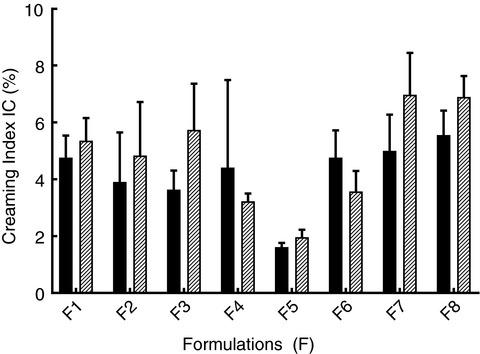当前位置:
X-MOL 学术
›
Lett. Appl. Microbiol.
›
论文详情
Our official English website, www.x-mol.net, welcomes your feedback! (Note: you will need to create a separate account there.)
Development and characterization of a carvacrol nanoemulsion and evaluation of its antimicrobial activity against selected food‐related pathogens
Letters in Applied Microbiology ( IF 2.4 ) Pub Date : 2020-11-20 , DOI: 10.1111/lam.13411 I. Motta Felício 1 , R. Limongi de Souza 1 , C. Oliveira Melo 1 , K.Y. Gervázio Lima 2 , U. Vasconcelos 2 , R. Olímpio de Moura 1 , E. Eleamen Oliveira 1
Letters in Applied Microbiology ( IF 2.4 ) Pub Date : 2020-11-20 , DOI: 10.1111/lam.13411 I. Motta Felício 1 , R. Limongi de Souza 1 , C. Oliveira Melo 1 , K.Y. Gervázio Lima 2 , U. Vasconcelos 2 , R. Olímpio de Moura 1 , E. Eleamen Oliveira 1
Affiliation

|
Carvacrol has been recognized as an efficient growth inhibitor of food pathogens. However, carvacrol oil is poorly water-soluble and can be oxidized, decomposed or evaporated when exposed to the air, light, or heat. To overcome these limitations, a carvacrol nanoemulsion was developed and its antimicrobial activity against food pathogens evaluated in this study. The nanoemulsion containing 3% carvacrol oil, 9% surfactants (HLB 11) and 88% water, presented good stability over a period of 90 days. In general, the carvacrol nanoemulsion (MIC: 256 µg mL-1 for E. coli and Salmonella spp., 128 µg mL-1 for S. aureus and P. aeruginosa) exhibited improved antimicrobial activity compared to the free oil. The carvacrol nanoemulsion additionally displayed bactericidal activity against E. coli, P. aeruginosa and Salmonella spp. Therefore, the results of this study indicated that carvacrol oil nanoemulsions can potentially be incorporated into food formulations, wherein their efficacy for the prevention and control of microbial growth could be evaluated.
中文翻译:

香芹酚纳米乳剂的开发和表征及其对选定食品相关病原体的抗菌活性评价
香芹酚已被公认为是食物病原体的有效生长抑制剂。然而,香芹酚油水溶性差,暴露于空气、光或热时会被氧化、分解或蒸发。为了克服这些限制,开发了香芹酚纳米乳剂,并在本研究中评估了其对食物病原体的抗菌活性。含有 3% 香芹酚油、9% 表面活性剂 (HLB 11) 和 88% 水的纳米乳液在 90 天内表现出良好的稳定性。一般来说,香芹酚纳米乳剂(MIC:大肠杆菌和沙门氏菌为 256 µg mL-1,金黄色葡萄球菌和铜绿假单胞菌为 128 µg mL-1)与游离油相比表现出更好的抗菌活性。香芹酚纳米乳剂还显示出对大肠杆菌、铜绿假单胞菌和沙门氏菌的杀菌活性。所以,
更新日期:2020-11-20
中文翻译:

香芹酚纳米乳剂的开发和表征及其对选定食品相关病原体的抗菌活性评价
香芹酚已被公认为是食物病原体的有效生长抑制剂。然而,香芹酚油水溶性差,暴露于空气、光或热时会被氧化、分解或蒸发。为了克服这些限制,开发了香芹酚纳米乳剂,并在本研究中评估了其对食物病原体的抗菌活性。含有 3% 香芹酚油、9% 表面活性剂 (HLB 11) 和 88% 水的纳米乳液在 90 天内表现出良好的稳定性。一般来说,香芹酚纳米乳剂(MIC:大肠杆菌和沙门氏菌为 256 µg mL-1,金黄色葡萄球菌和铜绿假单胞菌为 128 µg mL-1)与游离油相比表现出更好的抗菌活性。香芹酚纳米乳剂还显示出对大肠杆菌、铜绿假单胞菌和沙门氏菌的杀菌活性。所以,



























 京公网安备 11010802027423号
京公网安备 11010802027423号